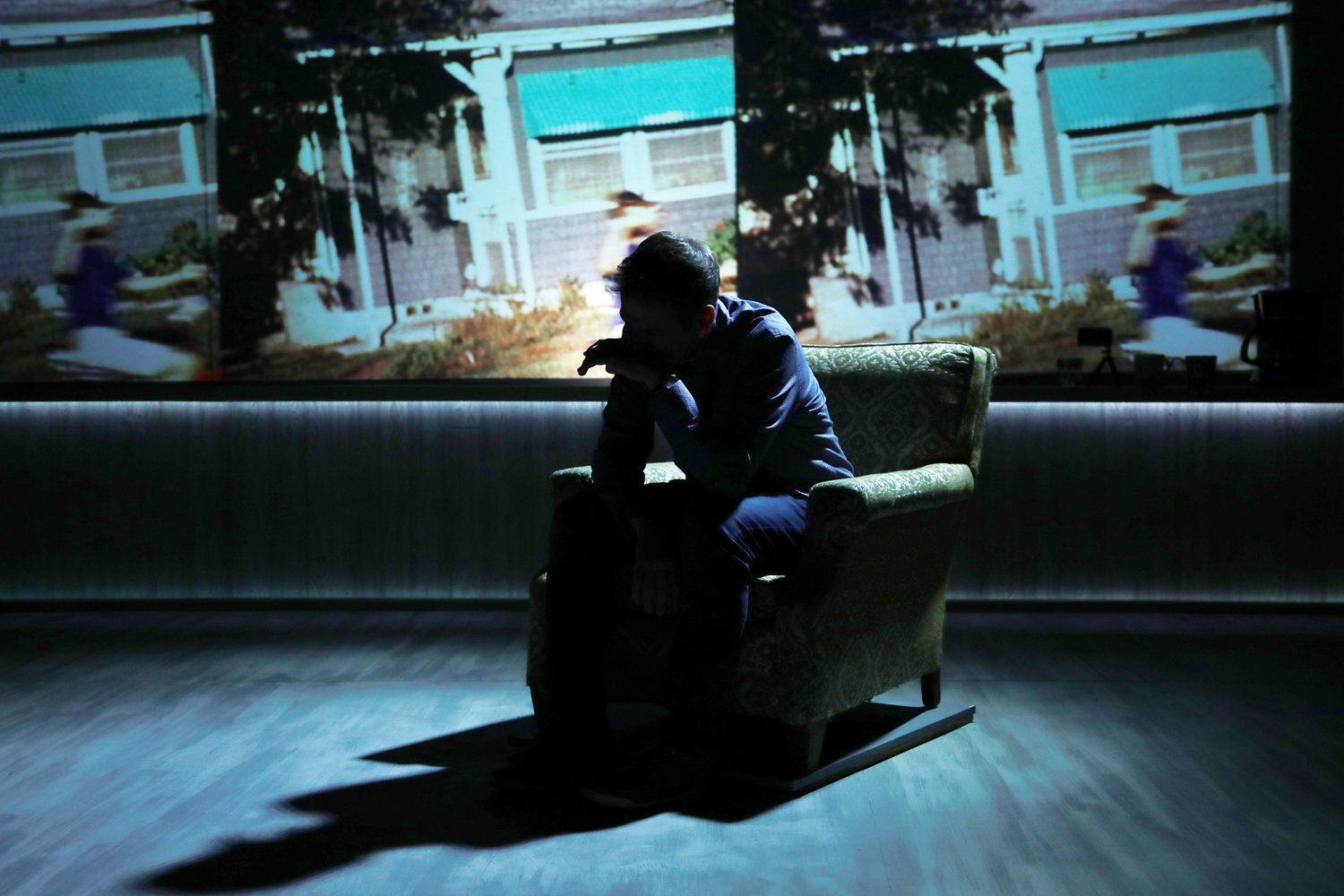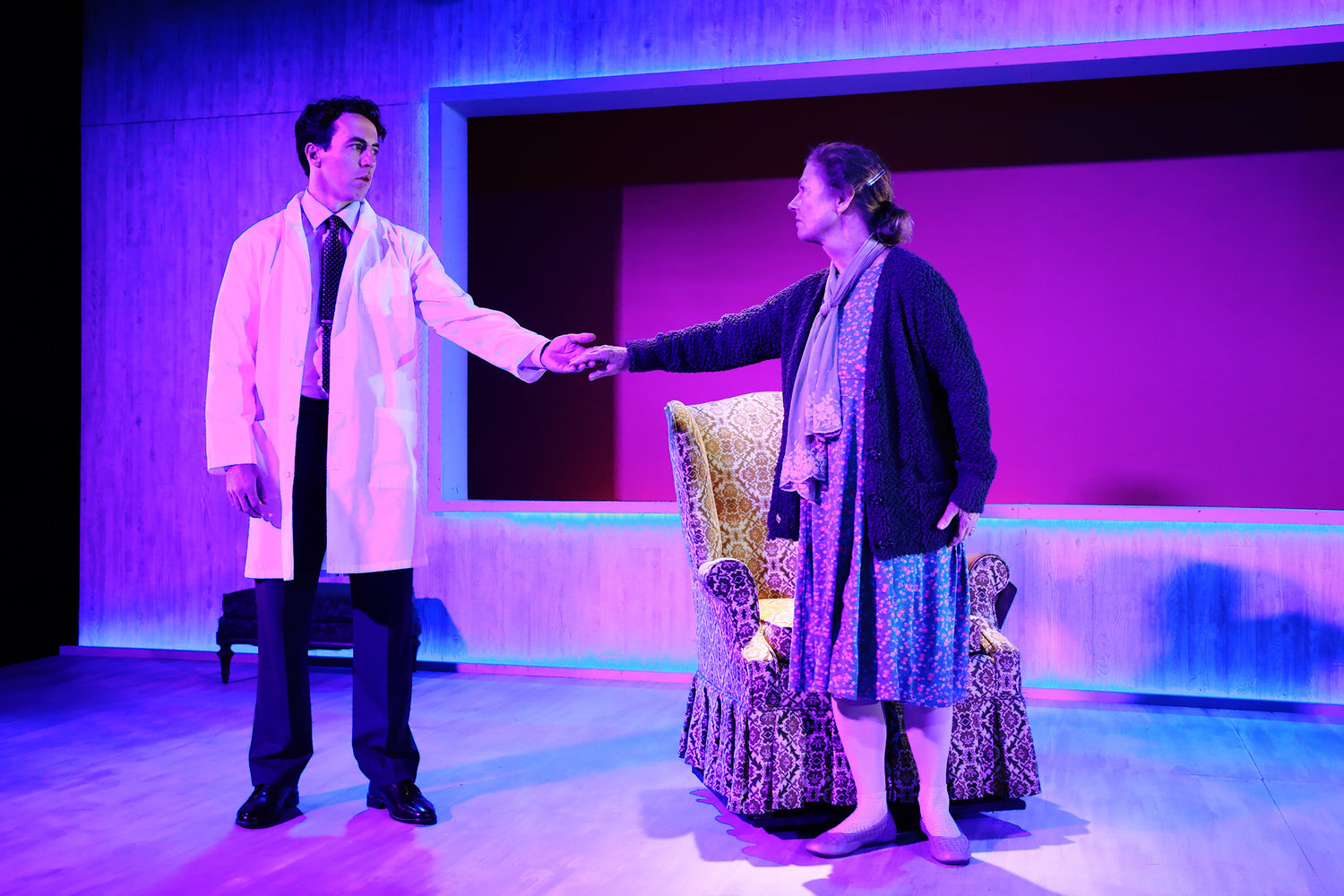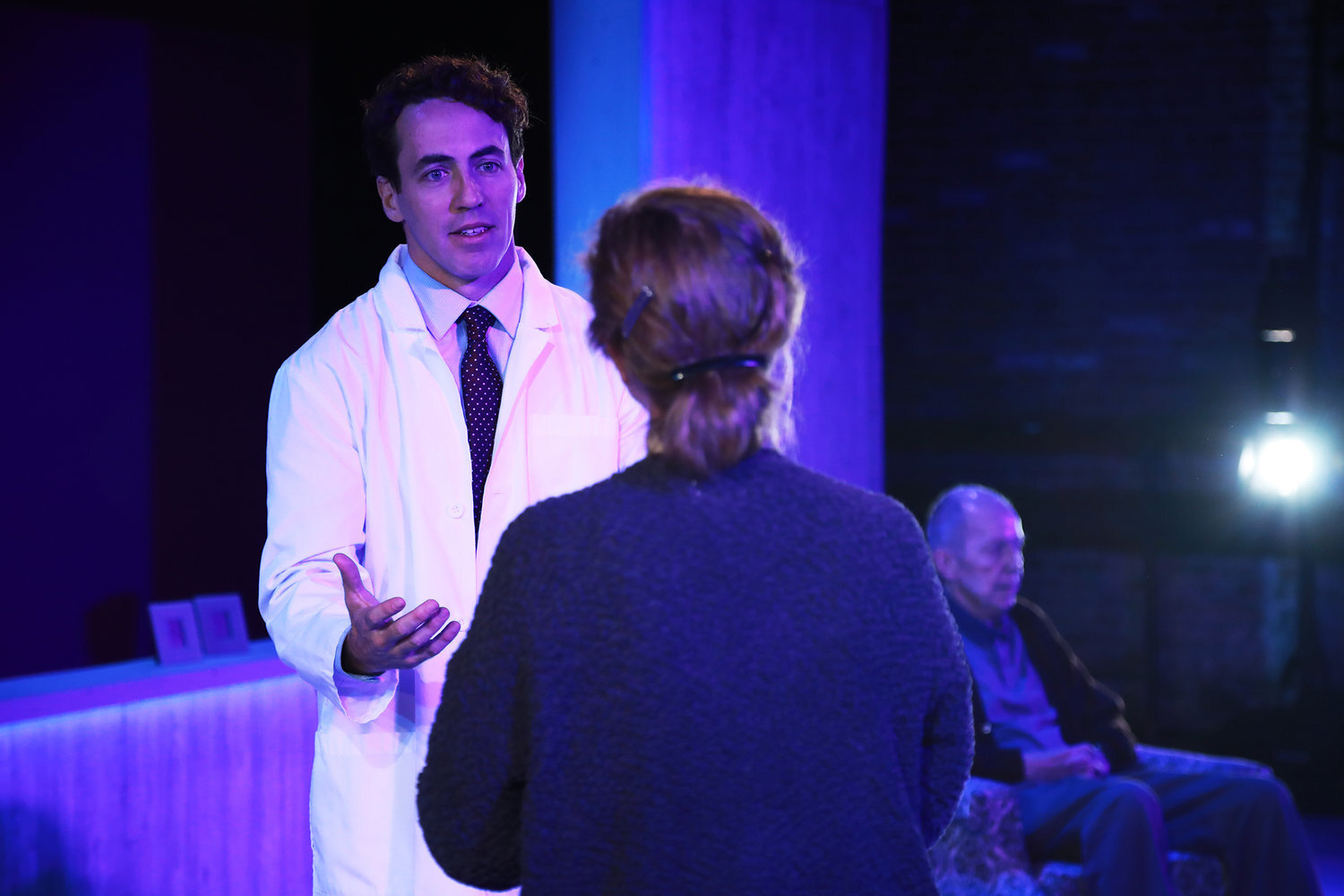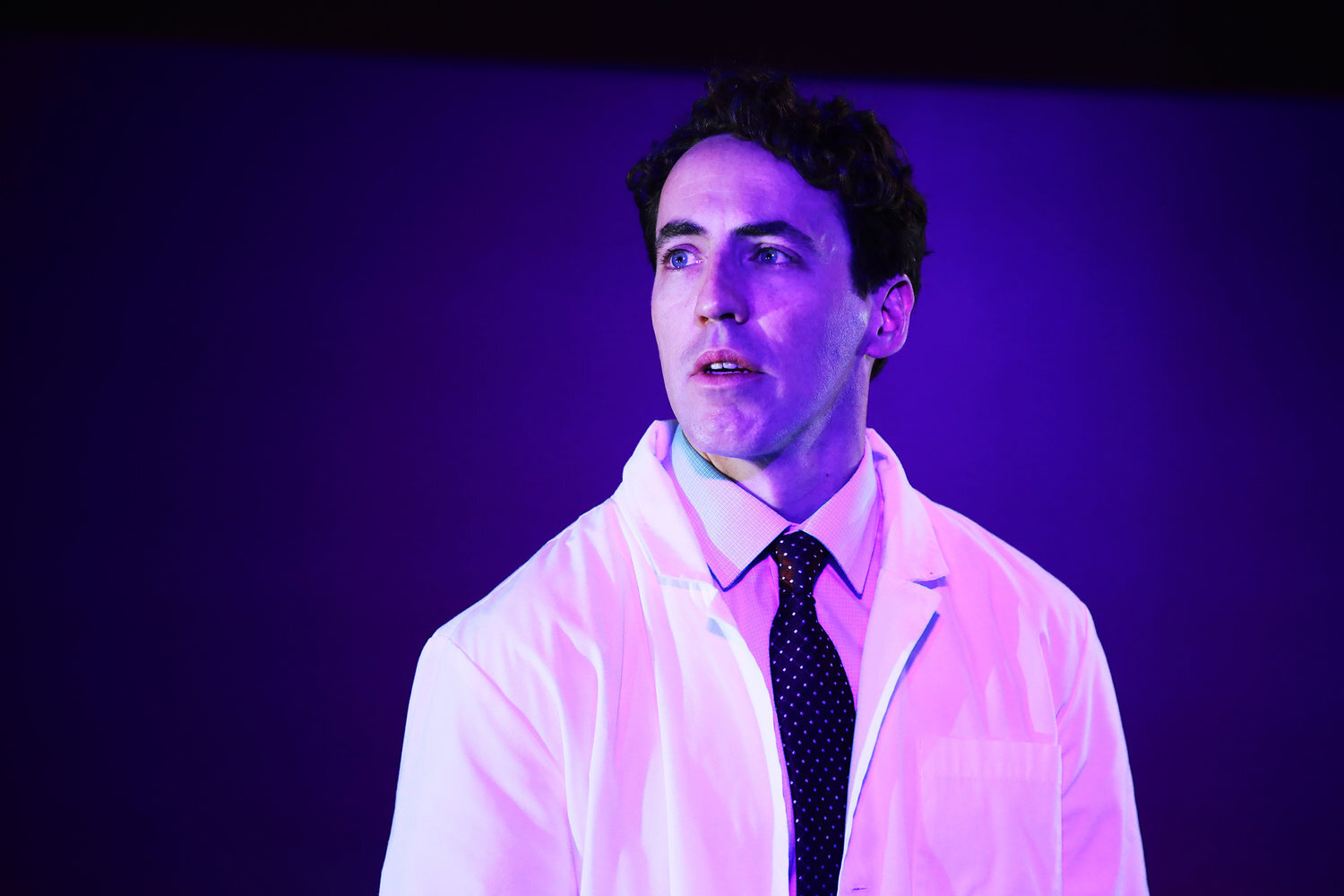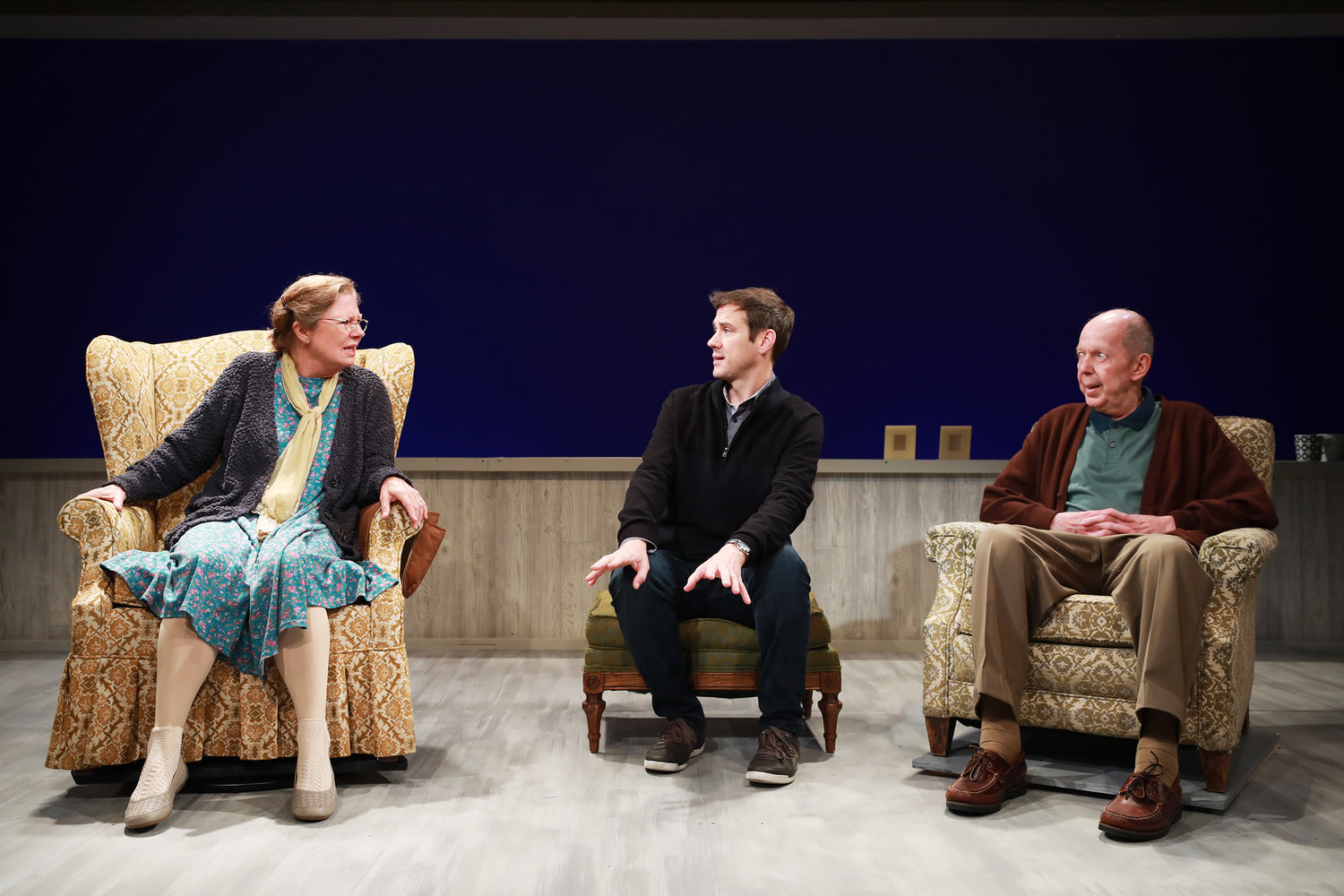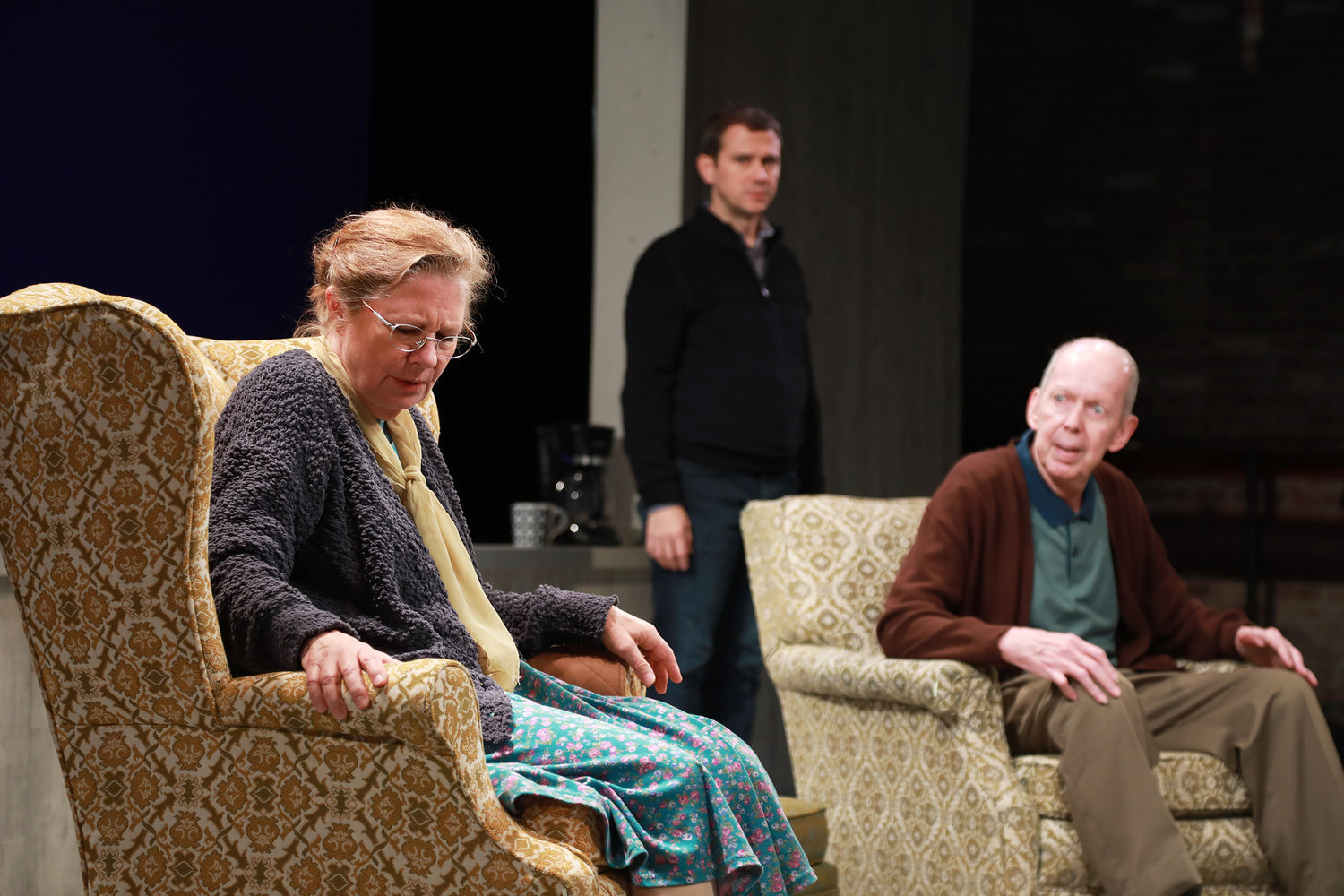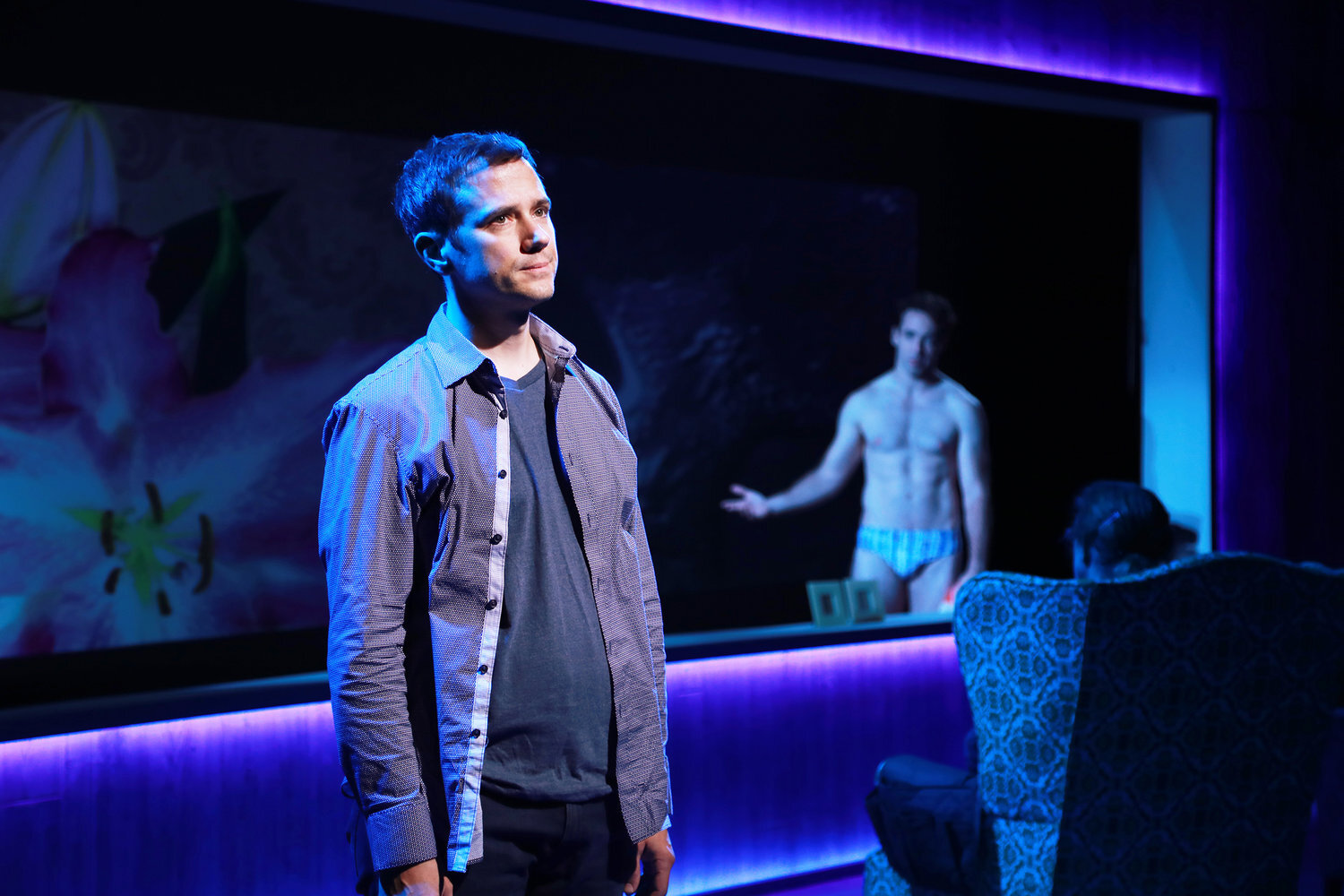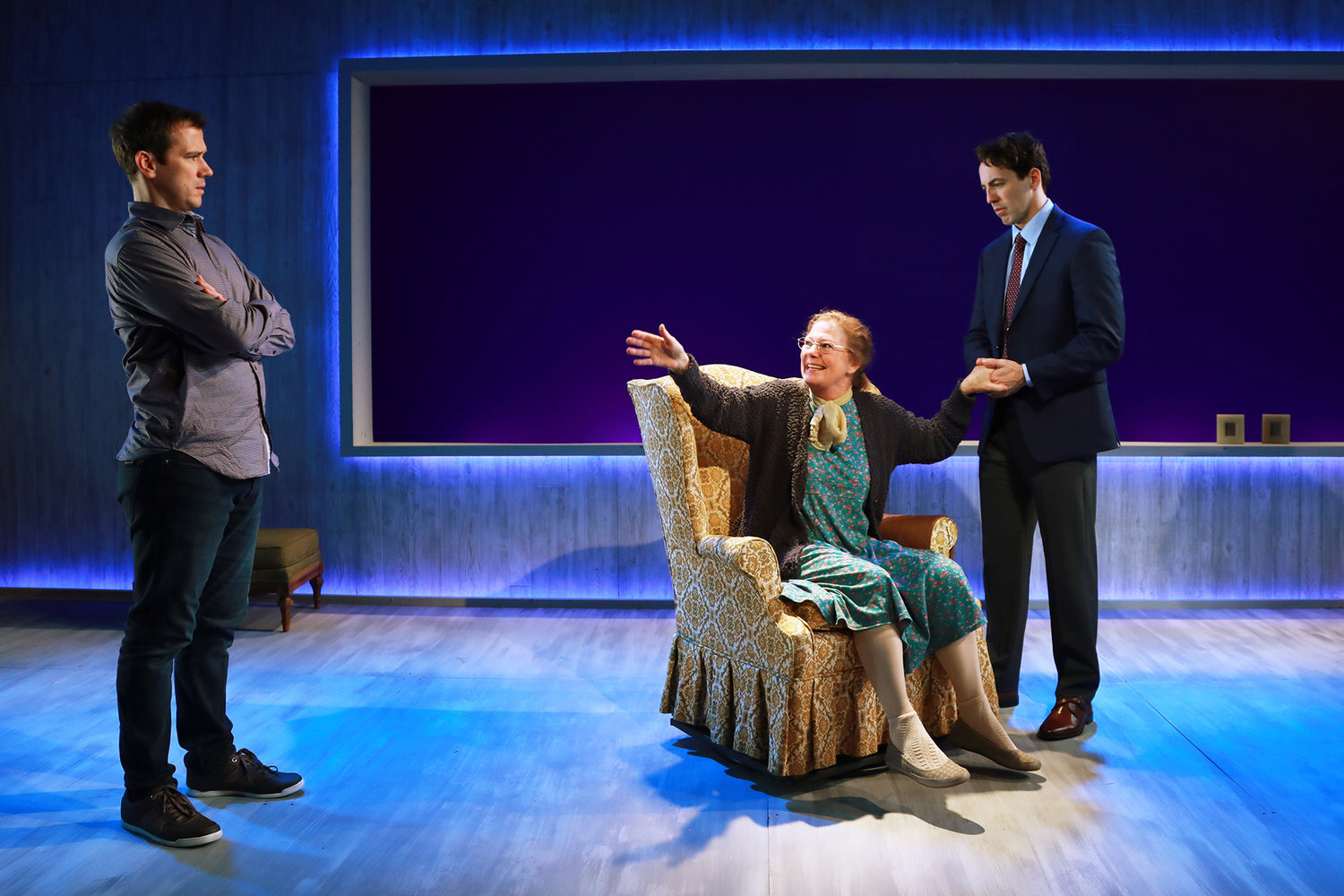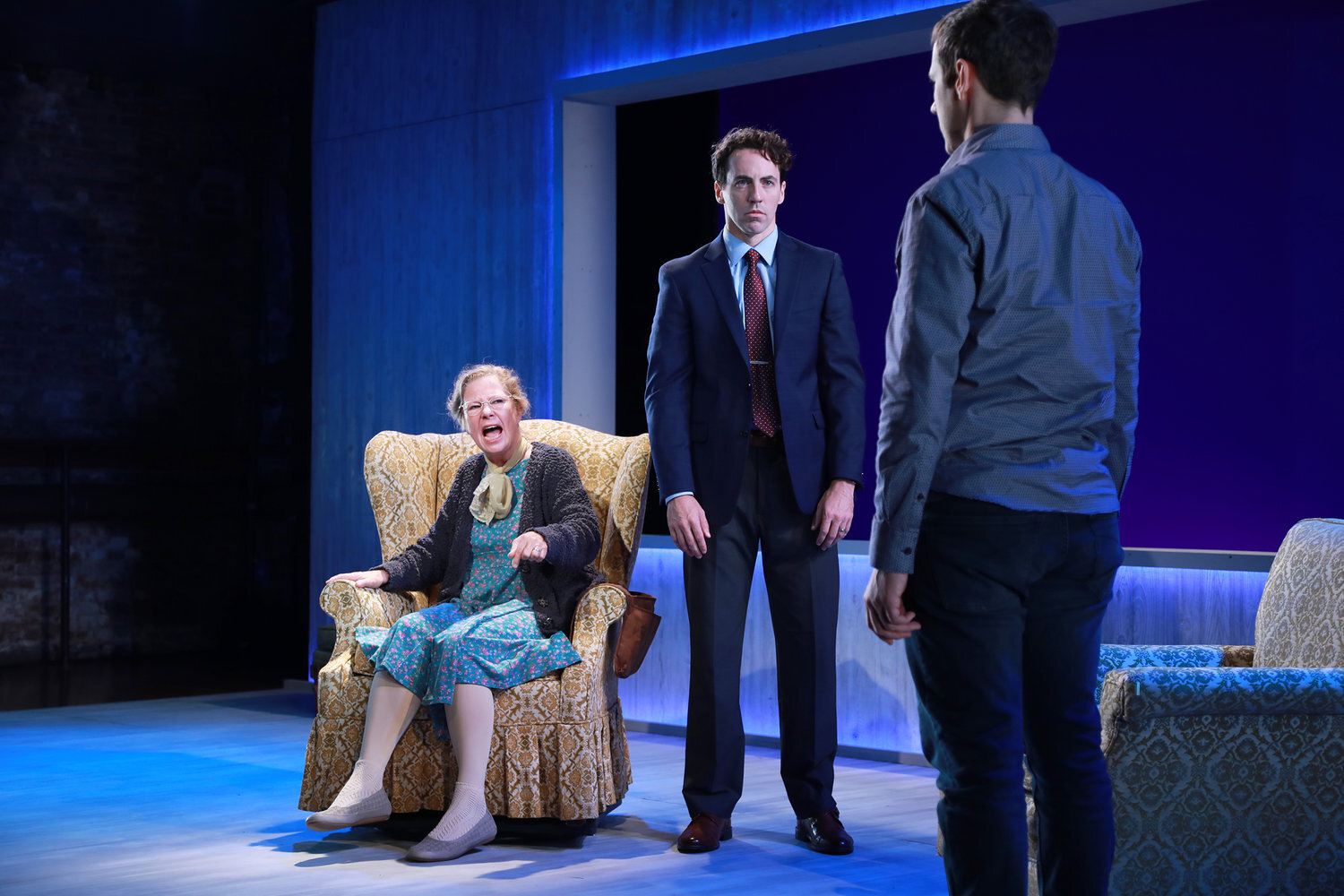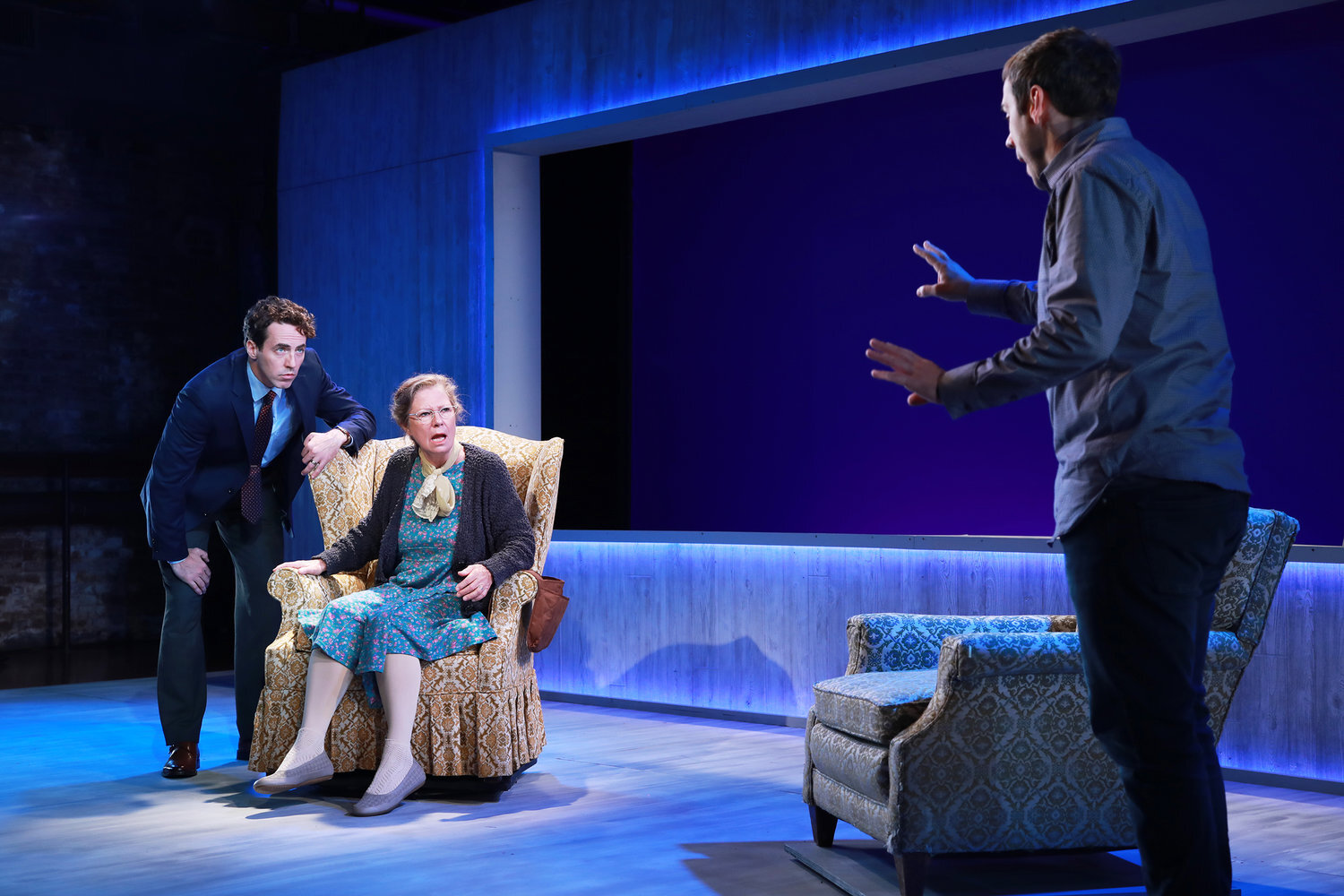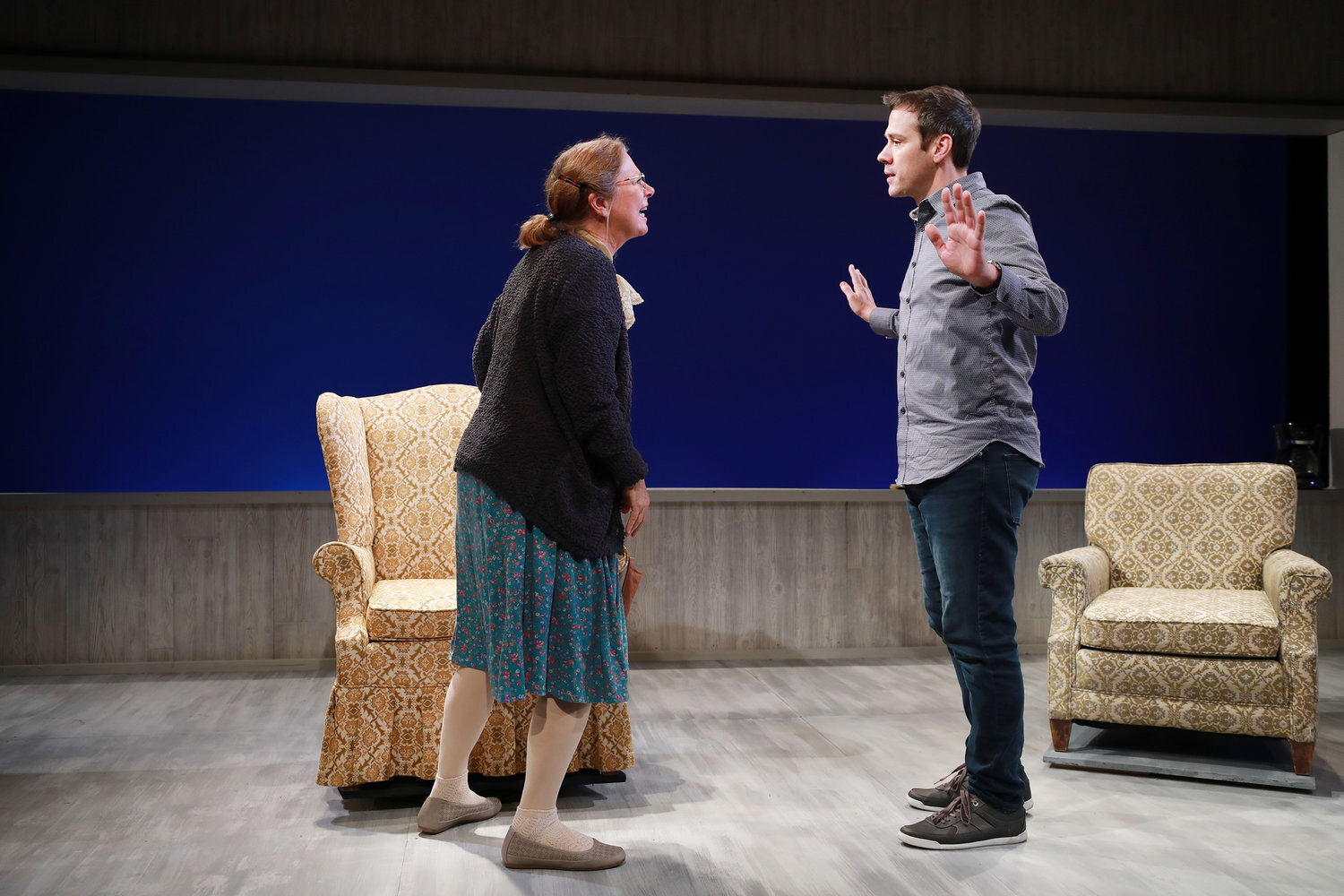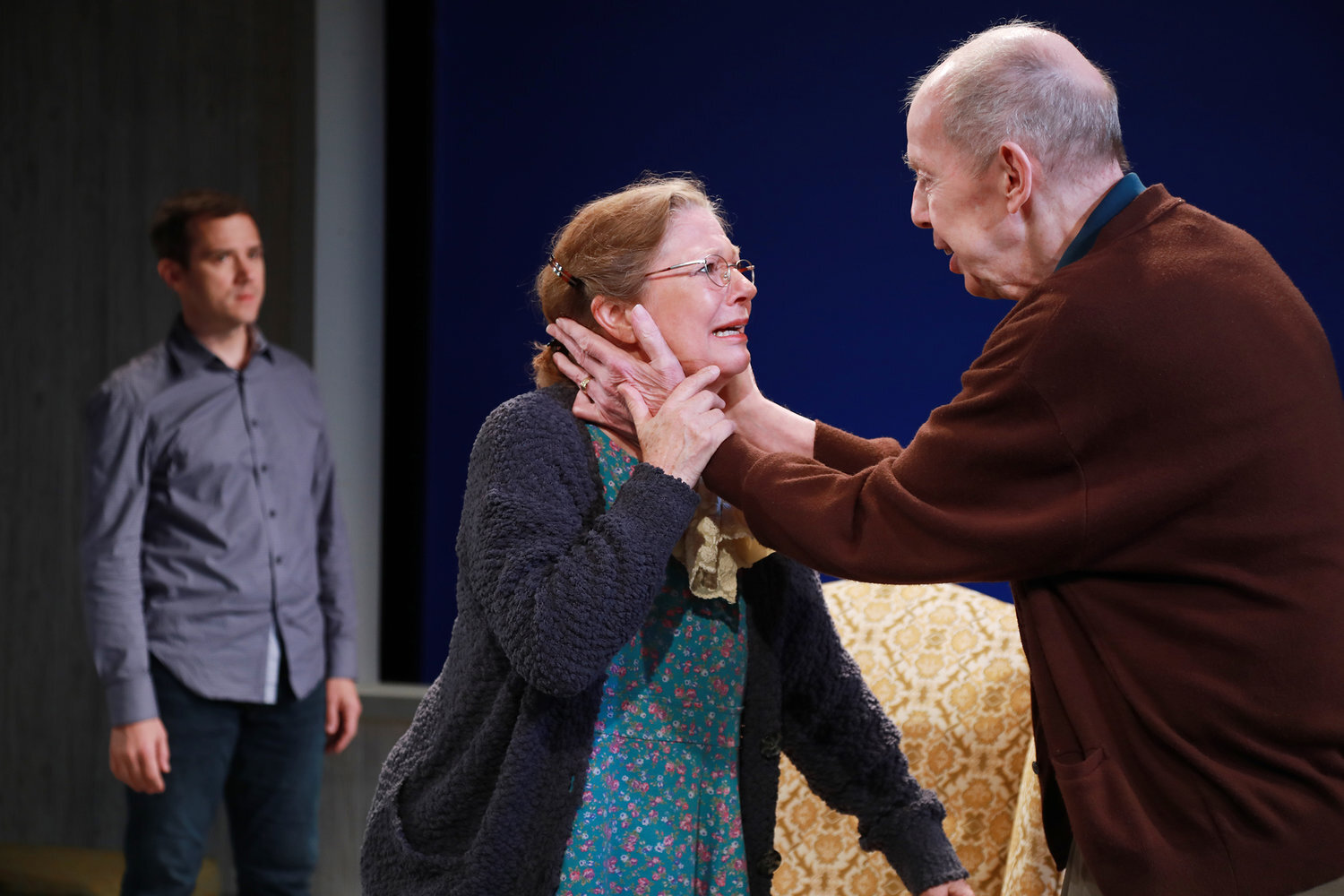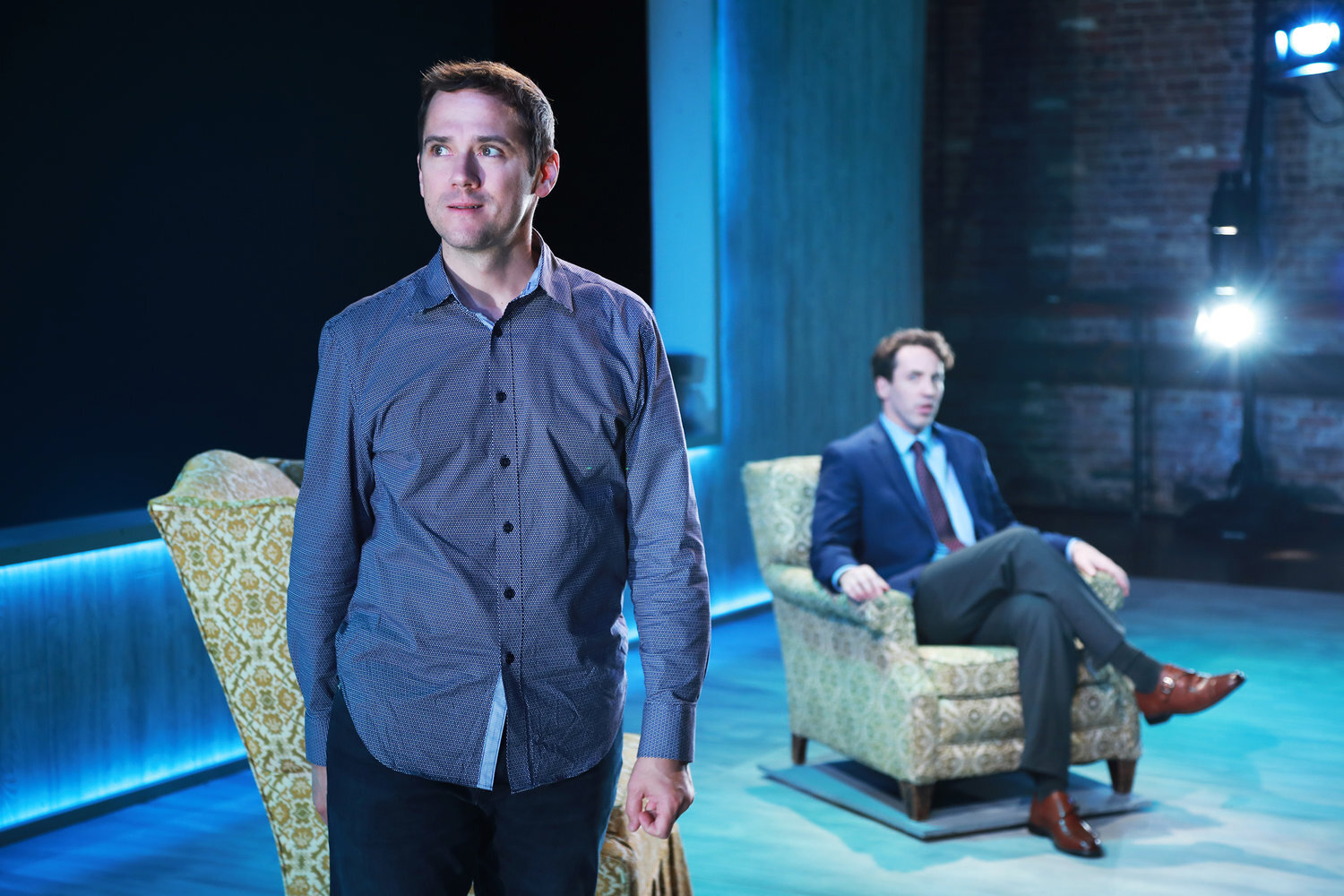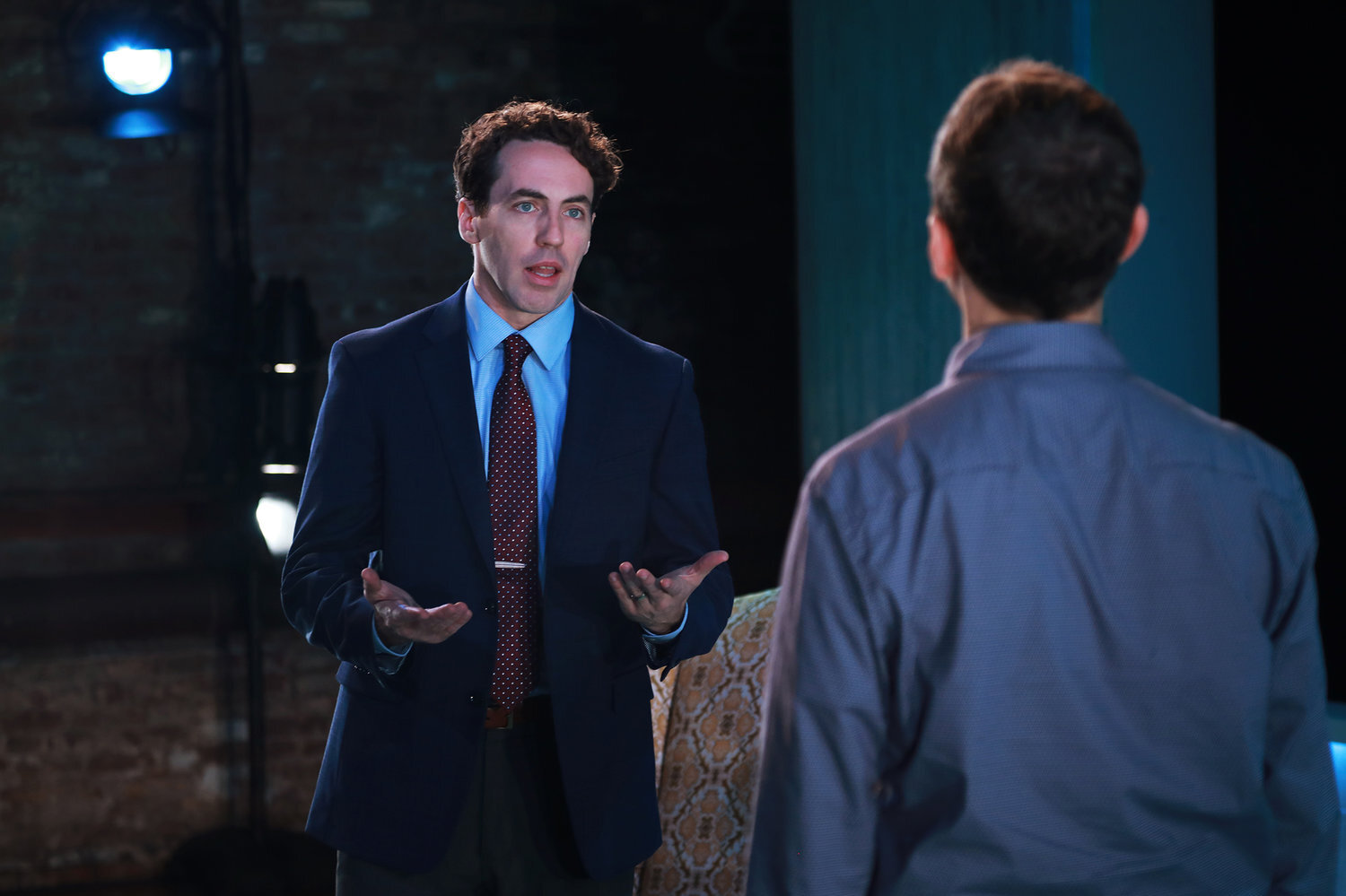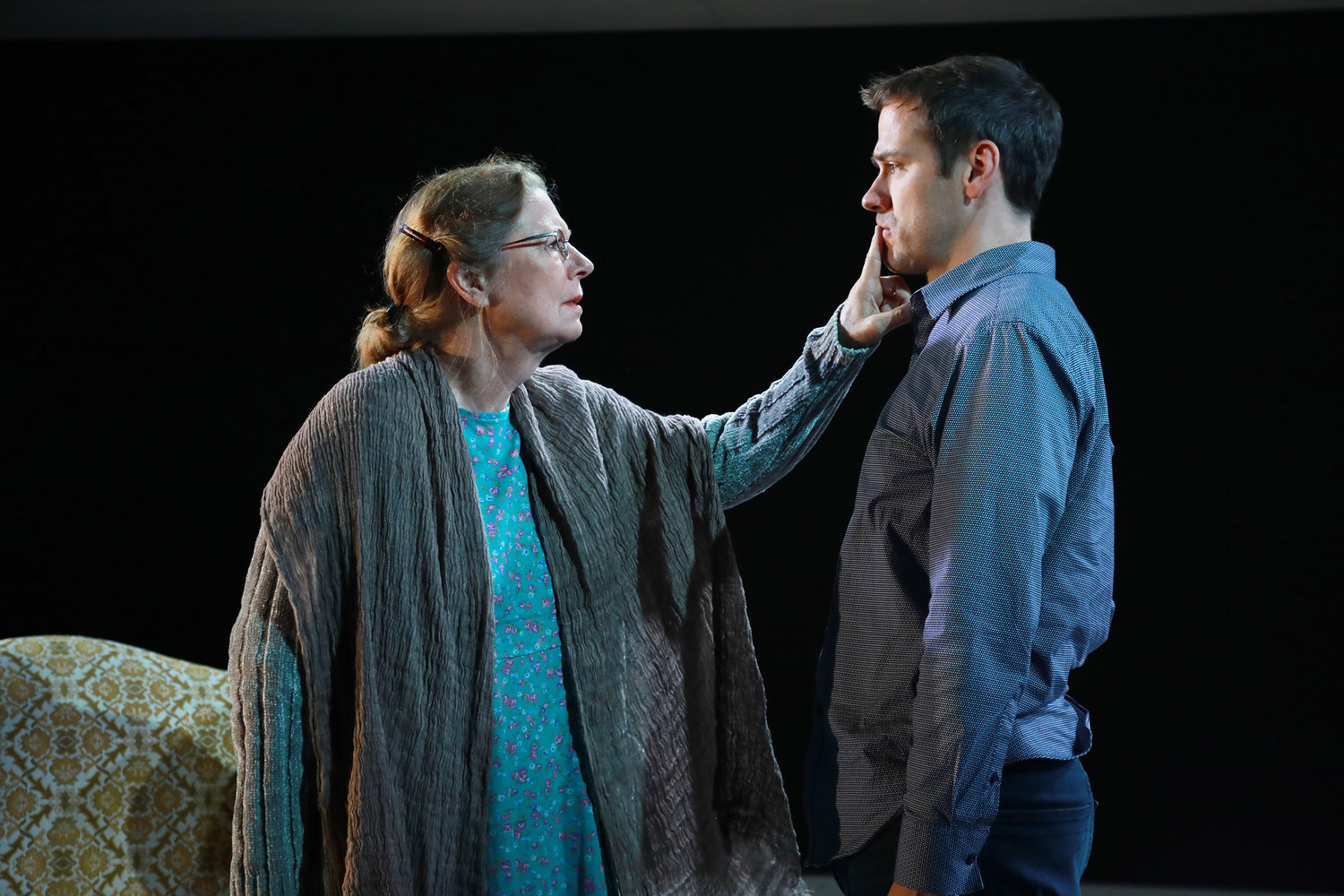All My Fathers
OCTOBER 3-19, 2019
La Mama
New York, NY
About The Show:
In All My Fathers, the playwright's elderly, demented mother says he’s the bastard child of the family pediatrician, her former employer, now dead. The surreal, seemingly scripted disclosure instantly rewrites his devoutly Christian, Southern upbringing. The tragicomedy incorporates Arthur Miller’s All My Sons and other family plays, such as Hamlet, Oedipus, Elektra, Well, and The Seagull.
Evan Yionoulis, an Obie winner, formerly Professor in the Practice of Acting and Directing at Yale School of Drama and Resident Director at Yale Repertory Theatre for twenty years and now Richard Rodgers Director of Drama at Juilliard, directs the production.
The cast is Richard Gallagher (“David”), Brian Hastert (“Dr. Woodman”), Deborah Hedwall (“Regina”), and Jonathan Hogan (“Bill”).
Playwright Paul David Young (Faust 3, In the Summer Pavilion) won the Kennedy Center’s Paula Vogel Playwriting Award. The design team is an extraordinarily distinguished group of artists. Lighting Designer Donald Holder won the Tony Award twice (The Lion King and South Pacific) out of thirteen career Tony nominations, plus a Drama Desk Award win and four additional Drama Desk nominations.
Costume Designer Teresa Snider-Stein has had a long run with Signature Theater and many Broadway and Off-Broadway productions (Playwrights Horizons, the Public Theater, Lucille Lortel Theatre, Classic Stage Company, the Vineyard Theatre, Irish Repertory Theatre (over 100 productions) and is currently Head of Costume Design and Assistant Professor of Theatre at Brooklyn College, CUNY.
Award-winning filmmaker Melissa Friedling, who will create the video and sound for the show, was an artist in residence at the International Studio and Curatorial Program in New York and the recipient of a Fulbright Award and artist’s grants from the New York Foundation for the Arts and the New York State Council for the Arts; she teaches filmmaking at The New School where she is Dean of Undergraduate Studies.
Set Designer Ao Li has worked internationally as a designer and visual artist; he founded the Intercultural Performance Studio in Shanghai.
CREDITS
Written by Paul David Young
Directed by Evan Yionoulis
With Richard Gallagher (“David”), Brian Hastert (“Dr. Woodman”), Deborah Hedwall (“Regina”), and Jonathan Hogan (“Bill”).
Press
LIGHTING & SOUND AMERICA:
THEATRE IN REVIEW
BY DAVID BARBOUR, OCT. 7, 2019
In his new play, Paul David Young takes a remarkably creaky premise and runs rings around it. The "my" of the title refers to David Younger, a middle-aged gay playwright living in New York but, as the play begins, visiting his parents in his Kentucky hometown. Bill, his father, is an easygoing, affable sort, but Regina, David's mother, is terrifying. She has suffered a stroke and undergone hip and knee replacements, and has diabetes, high blood pressure, and, probably, dementia. ("I take so many pills every day that, when I lay them out, it looks like a backgammon board," she notes bitterly.) In any case, her mental focus is nonexistent, and she repeats herself, endlessly and naggingly. During their first encounter, she asks David dozens of times if he is hungry, until he is all but shouting that he isn't.
Not that Regina intents to feed her son. Barely able to get out of a chair, she bids Bill to get some week-old chicken and a serving of potato salad of similar vintage from the refrigerator, despite David's frantic denials of hunger. David, still smarting from decades of spiky relations with his mother, is already on edge; who wouldn't be, with a parent spouting a nonstop stream of nonsense and misery? After fifteen years, she still refers to David's partner as his "roommate," and her comments are laced with resentment about, among other things, "eating fancy dinners all the time up in New York City." Practically every word Regina utters sounds like a premonition of doom: "I see more wrinkles than the last time you were here," she says, scrutinizing her son. When he protests that a recent doctor visit resulted in a clean bill of health, she adds, "Well, you know, those doctors will tell you one thing, until they tell you something else. Enjoy the time you got left." She also falsely accuses him of having AIDS, and, just as falsely, insists she has cancer.
All of this pales before the moment Regina takes David aside and drops the bomb that Bill isn't his biological father -- that, years earlier, working as an office nurse, she had an affair with Nick, the doctor who employed her. (Nick also coached David on the high school swim team, and David has mildly erotic dreams about him.) Amplifying the upset, Regina engages in lengthy conversations with the deceased Nick; to David, she appears to be talking to the air, although he is visible to the audience. When challenged by David, she snaps, "You can go back to New York and rot in hell." As a topper, the encounter ends in an awkward and humiliating physical confrontation.
These early scenes are juiced up to no end by the great Deborah Hedwall as Regina, a malicious sphinx dispensing venom from the comfort of her stuffed chair, when not disappearing altogether into a fog of confusion. She speaks in a rasp that becomes a roar when she isn't believed: It's a cataract of rage, with curses embedded in the blandest of statements. As horrifying as she is, there's something pitiful about her, especially the way she clings to the memory of the affair -- real or imagined - that seems to be one piece of her life that is hers and hers alone. Adding his own brand of felicity is Jonathan Hogan as Bill, the ultimate go-along-to-get-along guy, shuffling across the stage in no particular hurry, ineffectually trying to smooth over Regina's tirades and offering a tiny shoulder shrug in the face of the worst possible news.
Still, you might feel that you've seen All My Fathers many times before, under different titles and attributed to different writers; for years, it seemed as if playwrights were legally required to put their parents under a followspot and examine the many shortcomings that resulted in unhappy adult children. It's a point made by Nick during the lengthy epilogue in which David, who, having admitted he is the author of the play we're seeing, tries to quell his rebellious characters. Accusing David of "massaging the facts," Nick adds, "Part of it you even stole from other plays. Indeed, a quick perusal of the script reveals that the author has raided the Western canon, using it as kit of parts with which to assemble All My Fathers." "That's not stealing," David replies, lamely. "It's called intertextuality." Suddenly, a play that, for all its verve, seemed a little weighed down by a rather tired premise, announces itself as a work of real deviousness. As of this scene, the characters have entered some kind of theatrical astral plane where David continues to argue with his now-dead parents and struggles to come to terms with Nick, whose evasive answers only add to the mystery of his paternity. Indeed, Nick suggests that David may have planted the idea in Regina's addled mind: "It's noteworthy that there's no recording of the initial disclosure," he says, "because the whole story could have been something you suggested to her. No recording -- like Rose Mary Woods accidentally erasing those key five minutes of Richard Nixon covering up the Watergate break-in." By the time David undergoes a DNA test using 23 and Me, then hesitates to get the results, the other characters urge the audience members to demand that he take action.
Packed with curveballs, All My Fathers is also a work of considerable literacy. David reaches for Didier Eribon's memoir Returning to Reims -- also about a gay man fleeing his heartland home and dysfunctional family -- to describe a sense of "fleeing his class," becoming different versions of himself in Kentucky and New York. And, confronting the way his parents presented a united front, keeping their scandalous secrets from him, he offers a backhanded tribute to their "durational performance. Eighteen years as completely conventional, doubly Christian parents. This beats Tehching Hsieh and Marina Abramovic all to hell." Such self-conscious trickery may not be to everyone's taste, and there are moments when audience members may feel they have paid good money to aid Young with his psychotherapy. But there is poignancy as well as cleverness here: David's straightforward family drama is transformed into a hall of mirrors in which -- thanks to fading memory, death, and the passage of time -- the possibility of grasping the truth about his parents -- and his parentage -- continually recedes. Even when the results of the 23 and Me test are eventually revealed, he is left legitimately wondering exactly what he has learned.
In the end, All My Fathers is a surprisingly nimble and funny fantasia on an issue that affects all of us, even if one's family life wasn't a textbook nightmare and one's forbears have been long correctly identified. Evan Yionoulis stages these games of identity charades with fluency, slipping between reality and fantasy with supple skill. In addition to Hedwall and Hogan, two of New York's most gifted actors, Brian Hastert makes Nick into a thoroughly teasing figure of mystery. As David, Richard Gallagher has the most difficult task, especially since some of his dialogue sounds a little wooden, but he aptly conveys the character's mounting confusion and anxiety.
Ao Li's set design, a kind of abstract den with a floor and upstage wall made of wallboard, strikes the right stylized note; it also makes plenty of room for Melissa Friedling's wide-screen video imagery of sunrises, rippling water, synapses, web pages, and a final triptych of home movies that appear to have come from the author's collection. (Friedling also supplied the sound design.) Donald Holder's lighting uses subtle techniques, like LED edge lighting on the set, to signal the play's differing levels of reality. Teresa Snider-Stein's costumes are beautifully suited to the characters. An unusually confessional work, All My Fathers leaves David alone with a legion of questions. Maybe, Young's play suggests, that's all one ever gets; I have a feeling he knows this better than most.
http://www.lightingandsoundamerica.com/news/story.asp?ID=5NL6H1
VIEWPOINTS – Memory in motion: Paul David Young’s ALL MY FATHERS and Tennessee Williams’ THE GLASS MENAGERIE by Adrian Dimanlig
This past weekend, I caught back-to-back performances in the East Village – Austin Pendleton and Peter Bloch’s revival of Tennessee Williams’ The Glass Menagerie at the Wild Project and Paul David Young’s new play All My Fathers at La MaMa. What I didn’t expect is the extent to which these plays would speak to each other, particularly with their respective rumination on memory in theatrical terms.
First up was the revival of the oft-performed Tennessee Williams classic The Glass Menagerie (RECOMMENDED). Mr. Williams’ language remains as evocative and gorgeous as ever, which explains its frequent appearance on our stages (the play has been mounted on Broadway twice in recent years in pretty close succession). I can also see why directors have time and time again been drawn to the challenge of interpreting the very fabric of memory – so central to the play – for the stage. The great Mr. Pendleton and Mr. Bloch’s staging for Ruth Stage has been touted as accomplishing this by filtering the play through the lens of the horror genre (‘tis the season, after all!). Indeed, in many ways, The Glass Menagerie, particularly in its spectral final moments, is a ghost story. The central conceit of the play is that our narrator, Tom — quirkily portrayed here by actor Matt de Rogatis — haunts his memories, and vice versa. Ultimately, however, this revival is mostly a traditional rendition of the play, and that’s just fine. The production at the Wild Project is a lucid, single-act reading that’s beautifully-acted by a strong cast who have refreshingly resuscitated Williams’ iconic characters against type (e.g., I’ve never seen Tom’s relationship with Amanda so playfully rendered and genuinely loving).
Then we have Mr. Young’s new play All My Fathers (RECOMMENDED), which has been stylishly directed by Evan Yionoulis at La MaMa. Mr. Young uses a number of tools in his shed to tell the “pseudo” autobiographical story of his relationship with his parents, specifically in light of a family secret (no spoilers here) that was divulged towards during the twilight of their lives. The playwright leverages a number of classic plays from the American theatrical canon to inform his own story – even the work’s title references Arthur Miller’s All My Sons (which was splendidly revived on Broadway last season). Indeed, the play pays particular homage to The Glass Menagerie by depicting Mr. Young’s love-hate relationship with his frustrating and frustrated mother. Also like the Williams work in question, the playwright also explores the nature of memory itself – notably its correlation with the notion of truth and preexisting narratives – most prominently and strikingly in the play’s somewhat overlong but thought-provoking meta-theatrical coda. The acting is very good across the board, especially Deborah Hedwall and Jonathan Hogan, who gamely play Mr. Young’s aging parents with agility and color.
TIME OUT NEW YORK
Paul David Young's autobiographical tragicomedy is inspired by his elderly mother's revelation that his real father was the family pediatrician. Evan Yionoulis directs the world premiere, whose cast includes Richard Gallagher, Rebecca Hedwall and Jonathan Hogan.
WHAT’S COMING TO OFF-BROADWAY FALL 2019?
By Olivia Clement
Sep 01, 2019
From Game of Thrones’ Peter Dinklage in Cyrano to a new musical from Hamilton director Thomas Kail, here’s what’s on tap Off-Broadway from September through November 2019.
HTTP://WWW.PLAYBILL.COM/ARTICLE/2019-FALL-OFF-BROADWAY-PREVIEW
THEATER IS EASY — REVIEW BY REGINA ROBBINS, OCT. 13, 2019
As a gay kid growing up in a midwestern suburb, David (Richard Gallagher) couldn't wait to leave. His relationship with his mother Regina (Deborah Hedwall) was never easy, and time and distance haven't helped. Regina's Christian beliefs and critical nature have always made David feel unwanted; the fact that she's now afflicted with dementia just creates more tension. Still, David tries to be a dutiful son, visiting his folks back home, if only to support his mild-mannered father, Bill (Jonathan Hogan). But on one of these visits, Regina drops a bomb: David isn't Bill's biological son, she insists, but the product of an affair.
All My Fathers is a semi-autobiographical play that takes detours into dreams, memory, and literary history while trying to untangle writer Paul David Young's relationship to his parents. Young's onstage alter-ego, David tries desperately to determine what's true and what's not by confronting Regina and Bill, summoning his "real" father, Dr. Woodman (Brian Hastert), from beyond the grave, and sending his DNA to a genetic testing company. But the "truth" of his identity isn't as simple, he finds, as biology vs. history.
Director Evan Yionoulis handles the potentially heavy material with a light touch, keeping her cast's heads above the flood of twists and turns, with Hedwall and Hogan turning in performances that are both hilarious and poignant. Young's text mirrors the emotional journey of his "protagonist," in that it goes through a lot of different feelings but hasn't come to terms with what it all means. Occupying an imaginary space between soap opera All My Children and stage drama All My Sons (with some ingredients from Death of a Salesman), All My Fathers opens up a can of worms that it never figures out how to close. Your enjoyment of it will likely depend upon your tolerance for worms.
All My Fathers is by Paul David Young. Directed by Evan Yionoulis. Lighting Design is by Donald Holder. Set Design is by Ao Li. Costume Design is by Teresa Snider-Stein. Video & Sound Design is by Melissa Friedling. Stage Manager is Christine J. Colonna.
The cast is Richard Gallagher, Brian Hastert, Deborah Hedwall and Jonathan Hogan.
THEATER PIZZAZZ — REVIEW BY CAROLE DI TOSTI, OCTOBER 5
Every family has secrets. What is the efficacy of sharing them when some of the parties have long since died? Is the revelation necessary to expiate guilt, remorse and regret? Or is the disclosure of truth a useful revenge tactic? Paul David Young in All My Fathers directed by Obie-winner Evan Yionoulis raises these complicated questions. He leaves the resolution humorously unfolding in the second half of the production.
Young uncovers the decades-long family secret at the top of the play in a flashback that reveals the romance between Regina (Deborah Hedwall) and Dr. Woodman (Brian Hastert). Their loving relationship and intimacies produced a child which Regina considered aborting since she had another son with her husband Bill (Jonathan Hogan). But she’s a Christian. Rather than divorce Bill and marry Dr. Woodman, a resolution the pediatrician suggests, she decides to stay with the familiar and sacrifice her love to uphold her religion.
Decades later the time shifts to the present. The playwright focuses on son David (Richard Gallagher) who comes to visit Regina and Bill in Kentucky. David is a gay playwright living in New York City who is achieving success. He visits Bill and Regina because he intends to check on his elderly parents, catch up his life with them and hopefully restore any family unity that has disintegrated since his revelation that he is gay, and his move to NYC.
From the moment David walks into the living room, we note there is little affection expressed from his mother who would rather watch her TV program than to talk with her son. As the evening progresses, it becomes obvious that David is closer to his father than his mother who disapproves of his being gay and continually gets “under his skin.” Regardless of what he says, his presence seems to rankle her.
Events explode when cantankerous, addle- minded Regina dumps his true paternity on David’s lap. That she is a Christian conservative who has acted the “wild one,” is the height of hypocrisy. David thinks she is making up the story in a confusion caused by her dementia. However, when David questions her, the conversation escalates from argument to pushing and shoving. Bill who returns from the post office breaks up the furor just in time.
Does Regina’s emotional tyranny against David, who insists they never got along, reflect the complication of her love and regret that she never divorced Bill for Dr. Woodman? Perhaps. However, Regina is not self-aware or given to explanations to clarify for David who is roiled. As any woman might be under the fraught circumstances confronting her “bastard son,” she is inarticulate about the foundation of her guilt and self-hatred for not having the courage to divorce Bill and be with Dr. Woodman who has since died.
For his part Bill is sanguine, good natured and loving. He has known about her love for Dr. Woodman and has taken it in his stride. Meanwhile, David recalls Dr. Woodman and their relationship as he coached the swim team. As David’s doctor he tangentially supervised his growing up. The irony is that he never knew he was interacting with this kind man who potentially was his real father. But it didn’t matter, for Bill who has raised him has been a loving man in his life.
The problem comes when Bill remains equivocal. He suggests he only knows what Regina has told him. And of course, Regina is not the most reliable of confessors. What is the truth?
David attempts to confront this earthquake in his life asking even more questions. Young references Arthur Miller’s All My Sons, Shakespeare’s Hamlet, Chekov’s The Seagull and other plays, presenting David’s conundrum and populating it with absurd elements. The greatest absurdity occurs when Bill, Regina and Dr. Woodman, though dead, return to speak with David when a DNA test arrives and David discovers the truth.
All My Fathers is a clever, circumspect examination of paternity and “how to find it,” especially if one’s mom has been clouding the issue which women may do to save themselves and their children. Young’s humor is salient and sardonic. The actors are just terrific. Yionoulis’ direction reflects the balance needed to move from the dramatic beginning to the humorous, absurdist ending and the lovely reconciliation at the conclusion.
ALL MY FATHERS — FEATURE
BWW INTERVIEW: PAUL DAVID YOUNG ON RECONCILING THE PAST WITH ALL MY FATHERS
by Sarah Hokey, Oct. 14, 2019
They say art imitates life, and Paul David Young is no stranger to this.
He's made his career off of the unconventional, telling real-world stories in new ways and exploring life from a multitude of angles, with one of his most recent productions tackling the current political administration in a highly-praised satire. Young is no stranger to success either, as he's garnered numerous awards and accolades including the Kennedy Center's Paula Vogel Playwriting Award, and being a finalist for the Kendeda Fellowship and the Kennedy Center's John Cauble Short Play Award.
And now he takes it one step further with his newest production, All My Fathers. All My Fathers tells the story of Young's own devoutly Christian, Southern upbringing and how it was all rewritten with a sudden, surreal confession by his elderly mother regarding his paternity.
Yes, art imitates life, but in this case one could almost say that life also imitates art, as Young incorporates classic family plays such as Shakespeare's Hamlet, Arthur Miller's All My Sons and more to help weave the picture of his life for audience members every night.
With Obie-winning Director Evan Yionoulis at the helm, Young brings his family truth to the LaMaMa stage from October 3 to 20.
Young took a moment to chat with BroadwayWorld about the upcoming production.
What initially drew you to channel your personal story into this production?
This sudden, surprising assertion by my mother about my paternity fathered the play instantaneously, like Athena born from the head of Zeus. My life at that moment became a piece of theater, specifically an Ibsenian buried-secrets style plot. This was the kind of over-the-top story that I had never found quite credible, until it was happening to me in real time. The play began to write itself that very minute in my head. I didn't have a choice.
What was the creative process like?
I went through many drafts, beginning in a hyper realistic style, when I was too close to the events. I didn't know what the story was or meant. My first instinct was to stick to the facts, and let the audience decide, like a jury. I eventually wrote a version in German, just to shake up the process, and there I discovered the theatricality and structure of the play. I understood who the cast of characters would be and how the play would weave together truth, fiction, hallucination, dream, and memory. The story itself continued to evolve as I wrote, and the play became in part the story of its own strange creation.
What was it like working with Obie-winner Director Evan Yionoulis?
Wonderful, in a word. I was quite thrilled when Evan offered to direct the play after she read a couple of early drafts. I have of course followed her work closely. Seeing her production of Adrienne Kennedy's He Brought Her Heart Back in a Box at Theater for a New Audience last year was a great preview for me of what it would be like to work together on All My Fathers. I was so impressed by her thoughtful use of the TFANA space and the delicate unfolding of Kennedy's dreamlike tale. It helps that we have known each other a long time. We met in a French class in college.
What was it like incorporating such classic works like Oedipus, The Strange Discovery, and All My Sons?
The intertextuality came naturally in the writing, since I experienced these events as a kind of theater that happened to me. It dawned on me one day that much of dramatic literature deals with the family, including Oedipus, which specifically focuses on the mystery of paternal identity. Hamlet has a ghost father and a mother engaged in sexual betrayal. I discovered that these familial stories share themes and plotlines intersected with my story and that it was possible to compose the dialogue in my play by incorporating these other texts and, by inference, their stories and place in culture. It was eerie to find that, in a surprising number of instances, my parents had unknowingly quoted verbatim text from an existing play, such as All My Sons or Raisin in the Sun. In addition, in my work for some time, I have incorporated references. For example, a short play I wrote in graduate school that won a prize from the Kennedy Center (Aporia) incorporated U.S. State Department documents and television sports commentary. Faust 3: The Turd Coming, or The Fart of the Deal, my Trump satire of 2017, collaged Christmas songs, pop lyrics, poetry, Faust 1 & 2, and the Bible.
THE NEW YORKER—GOINGS ON ABOUT TOWN: REVIEW, OCT. 11 BY ROLLO ROMIG
In the hilarious first half of Paul David Young’s new play, David (Richard Gallagher), a version of the playwright, pays a reluctant visit to his childhood home, in Kentucky. His monster of a mother, Regina (a spectacular Deborah Hedwall), announces, through the fog of her dementia, that David’s true biological father was his (now dead) pediatrician, Dr. Woodman (a perfectly doctorly Brian Hastert), and not her long-suffering husband, Bill (touchingly performed by Jonathan Hogan). In the rambling second half, Regina and Dr. Woodman revolt against the way that David has told the story, with Woodman pointing out that the script borrows countless snippets of dialogue from famous family dramas to tell this purportedly autobiographical tale. The play is about the anxiety of influence, both genetic and literary—but, as directed by Evan Yionoulis, David gets a bit buried under all those words.
https://www.newyorker.com/goings-on-about-town/theatre/all-my-fathers-10-21-19
THE REVIEWS HUB — REVIEW BY CARRIE LEE O’DELL, OCT. 16, 2019
FIVE STARS * * * * * TO ALL MY FATHERS
Watching a parent age is difficult, especially if their memories are unreliable. Add a contentious past to the mix and it’s hard not to let frustration boil over into anger. An aging mother unloading a decades-old secret that challenges all that her adult son knows to be true about his parents is the inciting action of Paul David Young’s new play, All My Fathers, directed by Evan Yianoulis and currently running at La MaMa E.T.C.
All My Fathers opens with David (Richard Gallagher) a playwright from New York, returning to his childhood home in Kentucky to visit his parents, Regina (Deborah Hedwall) and Bill (Jonathan Hogan). Bill is solid, patient, and steadfast, while Regina gets on David’s last nerve—she insists she has cancer, but the doctor says otherwise. She forgets what she’s said from minute to minute, wakes him up at the crack of dawn, and, out of the blue, tells him that Bill’s not his biological father. Regina insists that she had an affair with the family pediatrician, Dr. Woodman (Brian Hastert) and that David was the result. We are unsure whether we should believe Regina or if these are dementia-induced fantasies. The question of who to believe becomes murkier as the play takes a metatheatrical turn and a conversation between David and Dr. Woodman (A ghost? A dream? Who knows?) reveals all of this things that David changed when he wrote the scene for the stage. The play ends with a long tale involving the customer service department of 23andMe and more questions, but no concrete answers.
Paul David Young based the play on an experience from his own life and incorporates material from a variety of plays about families from across the Western canon, from Oedipus to August: Osage County, from Fabulation, or the Re-Education of Undine to The Seagull. Amazingly, everything fits together cohesively to make a truly wonderful piece of theatre. In Evan Yionoulis’ capable hands, a script that could have been played as complete tragedy or as a mockery of the aging mind walks a fine balance that lets us laugh at absurdity of the situation but also see the genuine pain that it causes each character. Acting is stellar throughout, especially Deborah Hedwall’s Regina, who is both maddening and heartbreaking. Design elements are strong; in particular, Melissa Friedling’s excellent video design is complemented by Ao Li’s simple, versatile set.
Leo Tolstoy said that, “All happy families are alike; each unhappy family is unhappy in its own way,”; it’s quoted enough to be laughably cliché. In All My Fathers, Paul David Young manages to weave material from thousands of years of literature’s unhappy families into his own story and make it all sound like one family, undeniably distinct and yet painfully familiar. All My Fathers is remarkable work and should not be missed.
https://www.thereviewshub.com/all-my-fathers-la-mama-e-t-c-new-york-city
LA MAMA ANNOUNCES SEASON FEATURING WORKS BY ESTELLE PARSONS EVAN YIONOULIS AND MORE
by BWW News Desk Aug. 14, 2019https://www.broadwayworld.com/off-off-broadway/article/La-MaMa-Announces-Season-Featuring-Works-by-Estelle-Parsons-Evan-Yionoulis-and-More-20190814
LA MAMA PRESENTS PAUL DAVID YOUNG'S ALL MY FATHERS, DIRECTED BY OBIE-WINNER EVAN YIONOULIS, OCT 3-20
https://www.talkinbroadway.com/allthatchat_new/d.php?id=2465973
JONATHAN HOGAN, RICHARD GALLAGHER, DEBORAH HEDWALL, AND MORE WILL BE PART OF THE LA MAMA PRODUCTION, HELMED BY EVAN YIONOULIS.
http://www.playbill.com/article/world-premiere-of-paul-david-youngs-all-my-fathers-finds-its-cast
RICHARD GALLAGHER, JONATHAN HOGAN, AND MORE TO STAR IN ALL MY FATHERS
La MaMa will present the world premiere of Paul David Young's new play in a production directed by Evan Yionoulis.
Works like [Adrienne Kennedy’s] “Funnyhouse,” “A Movie Star Has To Star in Black and White” and “June and Jean in Concert” seem to take place inside their creator’s mind, at the point where conscious anxiety bleeds into troubling dreams. “He Brought Her Heart Back in a Box,” which has been directed with haunting lyricism by Evan Yionoulis for Theater for a New Audience, offers a historical, wider‐lens view of the same terrain. Occupying a mere 45 minutes of stage time (Ms. Kennedy’s favorite dramatic form is the short fugue), it nonetheless seems to stretch and bend through generations of conflict.
REVIEW: “‘HE BROUGHT HER HEART BACK IN A BOX,’ ADRIENNE KENNEDY’S BEAUTIFUL NIGHTMARE, ” BY BEN BRANTLEY, THE NEW YORK TIMES
Between its uncompromising, blistering rage and its condemnatory rhetorical stance, the play [Paul David Young’s Faust 3: The Turd Coming, or The Fart of the Deal] has many echoes of Biblical prophecy. . . . With its trove of references and dizzying wordplay, it is an impressive feat of rhetoric, and ensemble members Ayun Halliday, Aidan O’Shea, Regina Strayhorn, and Ben Watts deftly deliver Paul David Young’s ambitious text at a Beckettian, breakneck pace.
REVIEW: HYPERALLERGIC: “A FAUSTIAN SATIRE OF OUR SHITTY PRESIDENT” BY JOHN SHERER
"Kentucky Cantata [by Paul David Young] is a masterful work that is likely to stay with you for a long time after the final bows." "devastating" "brilliantly composed"
REVIEW, “TALKIN’ BROADWAY – KENTUCKY CANTATA,” THEATRE REVIEW BY HOWARD MILLER
(SELECTED BY MILLER AS ONE OF THE 13 BEST OFF-BROADWAY AND OFF-OFF-BROADWAY IN 2015)
“Owners” was Ms. Churchill’s first outing on the London stage, and she had yet to achieve the formal mastery that would make later plays like “Cloud Nine” and “Top Girls” instant modernist classics. But she already had full command of her voice and her themes, and the Yale Rep production, directed by Evan Yionoulis, adds a bold theatrical touch to lend the play a more adventurous, Churchillian style. Ms. Yionoulis employs mannequins instead of extras in a few early scenes, and then freezes the live action at key moments so that the mannequins seem to take over the storytelling. These stagy tableaux underline the artificiality of the proceedings and give “Owners” some of the stylistic novelty that Ms. Churchill was able to write into her later plays.
REVIEW OF ‘OWNERS,’ AT YALE REPERTORY THEATER - THE NEW YORK TIMES
Director Evan Yionoulis — a regular director at the Yale Rep for the last two decades, soon to leave her faculty position at the Yale School of Drama to head the Drama Division at Juilliard — has done many shows in the past that have kept audiences guessing, and staying raptly attentive, right up to the curtain call. There was the violence — and the preternaturally calm aftermath of that violence, of George F. Walker’s “Heaven” — back in 2000. There were the expressionless mannequins witnessing the explosive emotional outbursts of Caryl Churchill’s “Owners” in 2013. On the fun side, there was the delirious disco finale of “The King Stag” in 2004. Yionoulis cannily choreographs each cough, clench or askance look of the drama (or is it a romance? even a comedy?) so that it becomes a clue to Calderon’s tightly wound characters.
With some effective cutting and smooth storytelling, the director, Evan Yionoulis, has fashioned a clear and entertaining show out of Shakespeare’s very fine mess, with a strong cast and a rich spirited performance by Sheria Irving as Imogen, the central role.
REVIEW, “CYMBELINE” AT YALE REPERTORY, THE NEW YORK TIMES
The shocks in “Kiss” are not loud or bombastic. They are more like seismic psychological disturbances.
REVIEW, CALDERON'S 'KISS' FULL OF SEISMIC PSYCHOLOGICAL SURPRISES AT YALE REP - HARTFORD COURANT
“….Against a fantastic set by Ao Li depicting a stoop in Bedford-Stuyvesant, the action takes place in front of an apartment building where neighbors are as close as family….The visual story is powerful…”
THE REVIEW HUB [SCRAPS]
“The story brings us directly to the steps of a Bed-Stuy building, the focal point of this observed portrait of anger and remorse, designed with a strong sense of the time and the place by Ao Li…”
TIME SQUARE CHRONICLES [SCRAPS]
“That’s where he is when he raps the prologue to the play, rhyming fiercely about ‘an entire generation of black men who were never allowed to be’. Next door, on the boarded-up storefront of a bodega (the set is by Ao Li), a mural serves as a memorial to the Notorious B.I.G., his sad brown eyes looking out from a somber face.”-
NEW YORK TIMES [SCRAPS]
“Overall, Li’s set, though small enough to fit the intimate space, features a surprising amount of detail- the ubiquitous public trash cans, a graffitied streetlight, and meticulously placed trash.”
OFF OFF ONLINE [SCRAPS]
“Ao Li- The magic wand of theatrical stage”
SINO VISION
“The attractive set of this show, nicely designed by Ao Li, is, basically, a living room, with a front door and a door that leads to the other rooms.”
CONNECTICUT CRITICS CIRCLE [KISS]
“Thanks to designers Ao Li (set) and Kia Rogers(lights) the tiny space glows with rich color, which seems to trap the actors like insects in amber”
AMERICAN THEATRE [REAL]
"Richard Gallagher conveys all of Norman's charm and manages to make immaturity positively enchanting. His drunken dance from floor to sofa is a triumph of unself-conscious wiggling, while his puppy-dog looks would melt glaciers. Gallagher gives the show a warm, beating heart."
ALEX BROWN, SEVEN DAYS (VERMONT) REVIEW OF "LIVING TOGETHER" AT NORTHERN STAGE.
"Richard Gallagher plays the man for all the minor values he contains. His sad sense of humor is made too unappealing to be true and, in the oddest way, Gallagher makes the man devastatingly appealing for all that negativity. His Norman is accessible. His Norman is prepared for everything and he is surprisingly the top of the family food chain, dominant without being dominating."
J. PETER BERGMAN, THE BERKSHIRE EDGE REVIEW OF "TABLE MANNERS" AT DORSET THEATRE FESTIVAL.
"Richard Gallagher’s Norman is by turns charmingly despicable, laughingly infantile and riotously romantic; even a scene in which he gets inebriated is nothing short of adorable — no wonder all the women fall for him."
DAVID LAMPE-WILSON, THE CHESTER TELEGRAPH REVIEW OF "LIVING TOGETHER" AT NORTHERN STAGE.
"Richard Gallagher['s] . . . handling of Kushner's language is truly mesmerizing as he rambles with precision during his Matilda speech. Gallagher also shines in the second act park scene."
KEITH WAITS, BROADWAYWORLD.COM REVIEW OF "ANGELS IN AMERICA PART ONE: MILLENNIUM APPROACHES" AT ACTORS THEATRE OF LOUISVILLE.

